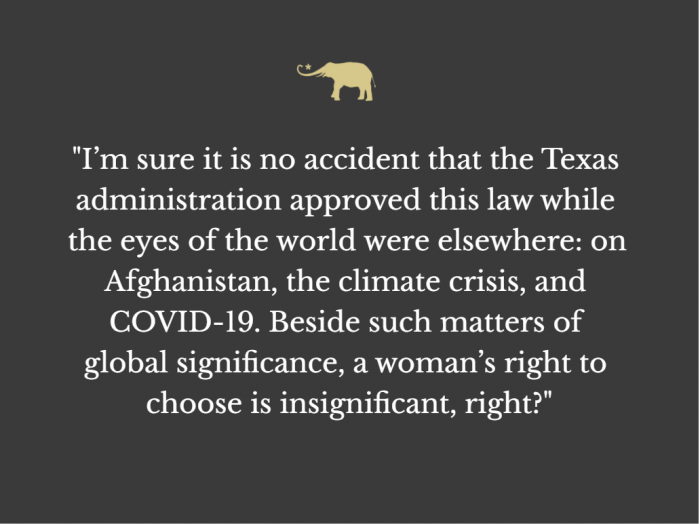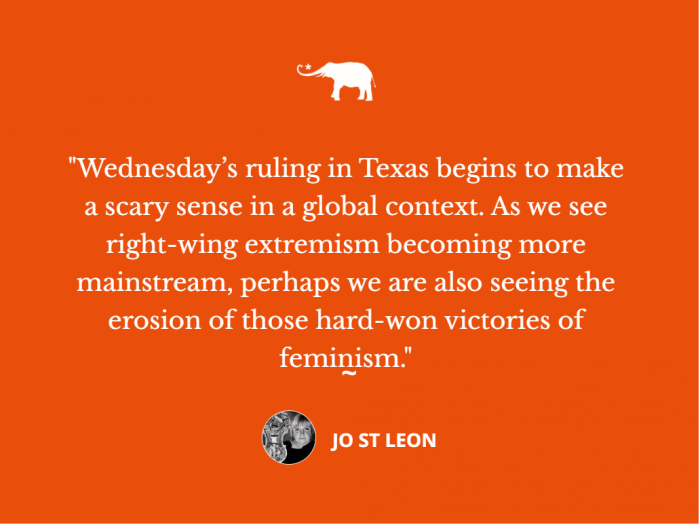View this post on Instagram
On Wednesday September 1, the state of Texas passed a controversial law prohibiting abortion after six weeks’ gestation.
This effectively makes all abortions illegal. The new law also offers financial incentives to private citizens who report and successfully sue anyone who undertakes, or assists in, an abortion beyond the time at which the foetus exhibits a heartbeat.
I read of this development with shock and disbelief, but I live a long way from Texas, in Tasmania (Australia), which I believe limits my right to comment on their affairs. Instead, I researched abortion rights and attitudes in my own country. What I found was in part reassuring, in part surprising, and in part a disturbing whisper that foreshadows how a decision such as that made in Texas can come about.
First, the reassuring. Abortion is legal in all Australian states and territories. All jurisdictions have safe access areas around abortion clinics, meaning that it is illegal to hold demonstrations or protests, or engage in any other forms of harassments within that area (usually 150 meters).
Surgical abortion on demand is freely available throughout Australia, although every state and territory differs regarding the foetal age beyond which medical approval is required. The range is from 14 to 24 weeks.
Next, the surprising. The decriminalisation of something that the majority of Australians regard as a right was astonishingly recent. Western Australia was the first to decriminalise abortion in 1998. South Australia—the last state to act—held out until 2021. Yes, you read that right; it was this year!
I am ashamed to say that although I have never been a passionate feminist, I have freely availed myself of all the rights, privileges, and freedoms that feminism has won for me. Until today, I assumed abortion had been one of those rights for many years. I was wrong.
And, finally, the disturbing. In the mid-1990s (which to someone of my age seems relatively recent), the Howard government brokered a deal with a conservative, independent Tasmanian senator: a support for proposed bills in return for introducing greater restrictions on abortion. In effect, this meant that abortifacient drugs became subject to a ministerial veto and were subsequently banned in Australia despite widespread use elsewhere.
This ministerial veto remained in place until 2006, although abortifacients were not approved by the Therapeutic Goods Administration (TGA) until 2012. This meant that although the drugs were legal, doctors needed special dispensation to prescribe them.
During the lead up to the 2019 general election, the Australian Labor Party put forward a proposal for a national abortion policy which included the funding of abortion in public hospitals throughout the country, thereby ensuring consistency of access. In response, Liberal Party leader Scott Morrison—now the Prime Minister—declared that this sensitive issue should be dealt with by the state governments. Seemingly Morrison, a proud Pentecostal Christian, was unwilling to express an opinion that may cost him votes.
This confirms what has long been known—legal issues around a woman’s right to decide are a matter of politics, not conscience. A person’s stance on abortion can be inferred by where they stand on the political spectrum. A woman’s right to make her own private and personal choice has been degraded and made into a political football to be publicly kicked around for electoral expediency.
Wednesday’s ruling in Texas begins to make a scary sense in a global context. As we see right-wing extremism becoming more mainstream, perhaps we are also seeing the erosion of those hard-won victories of feminism.
I’m sure it is no accident that the Texas administration approved this law while the eyes of the world were elsewhere: on Afghanistan, the climate crisis, and COVID-19. Beside such matters of global significance, a woman’s right to choose is insignificant, right?
The offer of financial incentives to effectively “dob” in your neighbours’ and friends’ smacks of a vigilante culture where justice is a matter of personal gain, rather than an impartial determination of right and wrong.
Are you hearing the rage?
I am belatedly becoming a card-carrying feminist. Clearly, feminists are still much needed. If we don’t want all those rights we take so much for granted to be stripped away, we must be vigilant.
The world is watching on in horror as Afghan women once again live in terror, and the most extreme patriarchy reasserts itself. But we need to tend to our own backyard as well. We need to make sure Texas is not just the tip of a large patriarchal iceberg.


 Share on bsky
Share on bsky






Read 46 comments and reply